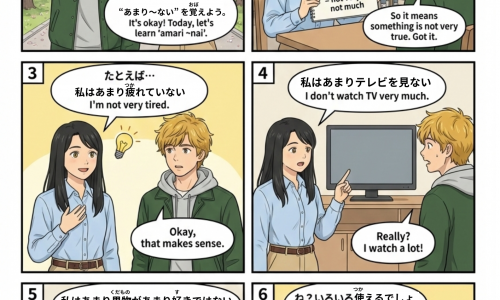- Home
- Blog Archives
Blog Archives
-

【JLPT N4★必要がある (hitsuyou ga aru)”it is neces…
Meaningneed to do something; have to do something; must do somethingGrammar P…
-

【JLPT N4★〜が必要だ (ga hitsuyou da) “need, neces…
Meaningneed something; require somethingGrammar PointExpresses that somethin…
-
【JLPT N4★はずがない (hazu ga nai)”cannot be”…
MeaningIt is impossible that...; There is no way that...; Cannot possibly...G…
-

【JLPT N4★はじめる (hajimeru)”to start, to begin …
Meaningstart to do something; begin to do somethingGrammar PointIndicates th…
-

【JLPT N4★はずだ (hazu da) “should be / supposed…
Meaning: should be / supposed to beGrammar Point: 「はずだ」is used to express the …
-

【JLPT N4★〜がする (ga suru) “to smell…, to sound…
Meaning: used to describe smells, sounds, and tastes that one perceives.Gramma…
-

【JLPT N4★ごろ (goro)”around, about”】
Meaning: indicates an approximate time (clock time, part of day, date).Grammar…
-

【JLPT N4★がる (garu)-suffix “to show signs of;…
Meaning: to show signs of feeling something; to behave as if one feels a certain…
-

【JLPT N4★でございます (de gozaimasu)” to be (honor…
Meaning: a very polite, formal version of です used in customer service, business,…
-

【JLPT N4★でも (demo): “or something”】
Meaning: even…, or something…, at least…Grammar Point: 「〜でも」is used to:1) giv…
-

【JLPT N4★だす (dasu) “to suddenly begin, to su…
Meaning: to suddenly start doing something; to begin doing something spontaneous…
-

【JLPT N4★だけで (dake de): just by】
Meaning: just by…, only by…, simply by…Grammar Point: 「〜だけで」is used to express…
-

【JLPT N4★場合は (baai wa)”in the event of”…
Meaning: in case…, if…, when…Grammar Point: 「場合(ばあい)」is used to describe what …
-

【JLPT N4★ば (ba) “if… then”】
Meaning: if…, when…Grammar Point: 「〜ば」is a conditional form used to express th…
-

【JLPT N4★あとで / 後で (ato de) “after, laterR…
Meaning: after, laterGrammar Point: 「あとで / 後で」is used to show that one action …
-

【JLPT N4★ あまり~ない (amari~nai): “not very, no…
Meaning: not very, not muchGrammar Point: 「あまり〜ない」is used to express that some…
-

Finished reading “After the Quake” by …
I finished reading "After the Quake" by Haruki Murakami. I usually read books in…
-

Finally finished reading “Saka no Ue no Kumo…
Yesterday I have finally finished reading "Saka no Ue no Kumo" (Clouds above the…
-

【JLPT N5★方向 directions Q&A】
(1)Q.地下鉄はどこにありますか?A.そこです。(2)Q.トイレはどこにありますか。A.まっすぐに行くとあります(3)Q.…
-

【JLPT N5★方向、行き方 Directions/Answers】
日本語 / Japanese(1)あそこです。(2)まっすぐに行くとあります(3)右に曲がって、左の一つ目の道です。(4)大学の北です。(5)郵便局…





















Recent Comments